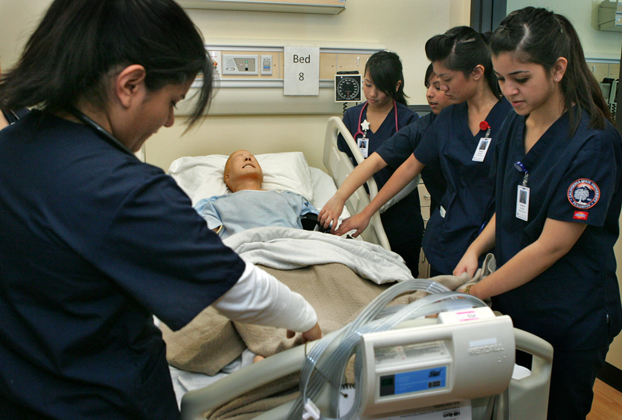 Caption: Students at work in the UnitedHealthcare Nursing Skills Lab practice their skills on a patient mannequin. Photo by Karen TapiaDownload Photo
Caption: Students at work in the UnitedHealthcare Nursing Skills Lab practice their skills on a patient mannequin. Photo by Karen TapiaDownload Photo
Doctor of Nursing Practice
Fullerton Among Campuses CSU Trustees OK for Pilot Programs
Jan. 27, 2011 :: No. 72
Cal State Fullerton’s School of Nursing is planning a doctor of nursing practice (D.N.P.) pilot program that could launch as early as fall 2012.
The CSU Board of Trustees Wednesday approved the planning of three such pilot programs. One will be offered jointly by the Fullerton, Long Beach and Los Angeles campuses; another will be offered jointly by Fresno and San Jose; and the third by San Diego State University.
“The D.N.P. is a professional-practice degree, similar to that obtained by physicians, pharmacists and other practitioners,” said Cindy Smith Greenberg, professor and director of Cal State Fullerton’s School of Nursing.
“In this age of expanding health care knowledge, the D.N.P. prepares nurses for work in increasingly complex health care systems. To improve health care outcomes, the evidence generated by research must be translated into clinical practice,” she said. “The D.N.P. prepares practitioners to evaluate the available scientific evidence and use it in clinical practice to provide best-practice interventions ultimately improving the quality and safety of health care.”
Cal State Fullerton’s nursing program is one of the largest in the California State University system. Enrollment has grown by more than 1,200 percent between 1998 (69 nursing majors) and 2009 (857 majors). Today, the number of nursing majors has climbed to about 900.
A decade ago, the program had four nursing faculty members. Today, the nursing faculty numbers 76 — a mix of full- and part-time members.
In addition, the School of Nursing now houses a state-of-the-art $1.6 million UnitedHealthcare Nursing Skills Lab, which allows students to practice their nursing skills. It features an 11-bed hospital wing with emergency, surgical and pediatric rooms, a patient exam room, infant-care stations, a 30-seat classroom, a six-seat study room and conference room.
In the last few years, several degree options have been added, bringing to 10 the number of different academic pathways offered today in the School of Nursing. The new pathways include entry-level programs for students who are not nurses — a four-year bachelor of science in nursing and a master of science in nursing. In the master’s program, concentrations have been expanded to include women’s health care with nurse practitioner and midwifery emphases, school nursing and nurse educator.
One of the university’s aims is to prepare more nurses to work in myriad settings, thus curbing the nation’s nursing shortage, which is projected to reach 800,000 by 2020.
At present, the nationwide shortage of nurses is estimated to be 150,000, according to the Bureau of Health Professions of the U.S. Department of Health and Human Services. In California, which ranks in the bottom five states for registered nurses per capita, the shortage is estimated to be as high as 50,000 by 2015.
Cal State Fullerton offers the following academic programs in nursing — all fully accredited by national and statewide accrediting agencies — that lead to bachelor of science or master of science degrees:
- Prelicensure bachelor of science in nursing (four-year program starting with first-time freshmen)
- R.N. to B.S.N. (offered on campus and at partner-based facilities, such as at Kaiser Permanente and other health care corporate group sites throughout the state)
- R.N. to M.S.N. accelerated program
- Prelicensure, or entry-level M.S.N. for students with a bachelor’s degree in a non-nursing field
- Nurse anesthetist concentration
- Nursing leadership concentration
- Women’s health care concentration-nurse practitioner emphasis
- Women’s health care concentration-nurse midwifery emphasis
- School nursing concentration
- Nurse educator concentration
“It’s a real honor and a tribute to our School of Nursing that Fullerton was selected as one of the campuses in the CSU to offer the D.N.P.,” said Roberta E. Rikli, emeritus dean of the College of Health and Human Development.
“Per nursing accreditation standards, all nurses in the advanced-practice fields — nurse practitioners, nurse anesthetists, clinical nurse specialists and nurse midwives — will have to have the doctorate, in order to become licensed to practice by as early as 2015,” she said.
“This is mainly due to the expanded, more advanced role that nurses are playing in providing health care, a situation that is expected to increase in upcoming years, in response to health care reform and to the need for more care for more people, especially the huge population of aging baby boomers,” Rikli added. “Therefore, being able to offer the doctorate is important not only for our students’ career success, but also for meeting the health care needs in our community.”
Four months ago, California adopted AB-867, allowing the CSU to offer the D.N.P. degree. Students who earn the degree would be qualified to work as nursing faculty members at CSU and community college nursing programs, thus helping to curb the nation’s nursing shortage.
Jan. 27, 2011
